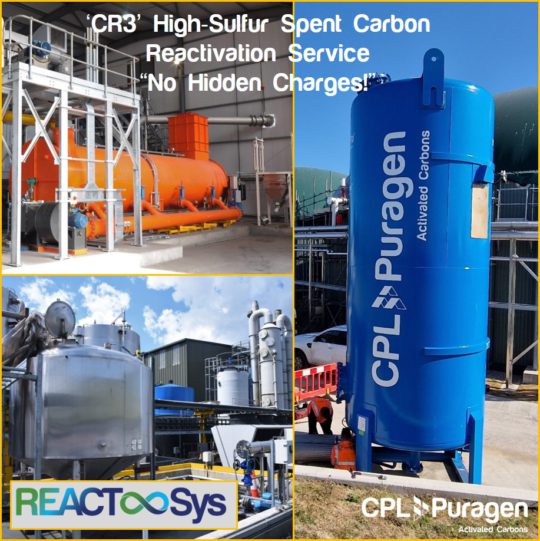Biogas & biomethane operators – Are you disposing of spent activated carbon with a high sulfur loading?
Until recently, these heavily loaded spent carbons (typically >20% loading) had to be disposed of as waste, since the technology didn’t exist to safely and economically reactivate them.
Well, that has all changed thanks to a major technological breakthrough by Puragen, which is unique in the market. After extensive R&D and development work by our team of experts, we can now take-back your high-sulfur spent carbons and recycle them at our award-winning thermal reactivation facility in the UK.
Commenting on this new technology, our MD Steve Bell stated, “Other carbon companies may claim to have this type of capability in development, but we already have our ‘CR3’ process up and running, providing a unique service to the biogas industry that demonstrates our technological and thought leadership in this sector. What’s more, with Puragen there are no hidden charges – we are up front about what we will charge and don’t hit customers with ‘extras’ once they’ve signed up with us!”
This breakthrough further demonstrates our commitment to the recycling of activated carbon wherever possible, to achieve a circular environmental filtration solution.
The benefits of this process are clear:
- Reduce/eliminate costly waste disposal
- Reactivated carbon has a far lower CO2 footprint than virgin material, >80% saving
There are many other advantages of working with Puragen:
- Wide range of specialised activated carbons for biogas/biomethane purification and odour control;
- Extensive fleet of VOCSorber® mobile carbon filters, engineered and produced in-house by Puragen Icon in Chesterfield;
- Large reactivation capacity in the UK;
- In-house R&D and QA support;
- A friendly team with many years of experience helping customers in multiple sectors;
- Great hassle-free service levels;
Our REACT-Sys® process offers a full circular reactivation solution and we are the only activated carbon company who can handle your high-sulfur spent carbons.
The Puragen Promise – we will safely and economically recycle your spent activated carbons, reducing your environmental impact, and we won’t charge to extra for the pleasure – No Hidden Charges!
Source of sulfur in biogas
So, where does the sulfur come from in biogas, which subsequently causes such an issue for spent carbon handling? One of main contaminants is biogas, formed by the anaerobic decomposition of organic waste, is hydrogen sulfide (or hydrogen sulfide, if you still prefer the old-school non-IUPAC spelling) commonly shortened to its chemical symbol H2S. This is a toxic, corrosive and odorous gas that can cause damage to metallic components, particularly high-value CHP (combined heat & power) engines as well cause emissions issues. It is critical for biogas and biomethane operators, including landfill gas (LFG) operators, to remove this corrosive contaminant from the biogas stream, and impregnated activated carbon is the best available technique for achieving this gas clean-up. Standard, non-impregnated carbons are generally not so good at removing these inorganic impurities (other examples of which include ammonia, NH3). Instead, standard activated carbon products are ideal for removal of organic contaminants, including siloxanes, limonene, terpenes and other VOCs.
Of course, in addition to biogas and biomethane, there are many other purification applications for activated carbon whereby we can recycle your spent adsorbent at our thermal reactivation centre in Immingham, north east Lincolnshire. We have a completely separate facility, called CR1 or the ‘Green’ kiln, for handling spent carbons from drinking water and food grade applications. Other industrial applications, such as wastewater treatment, remediation, liquid chemicals and general air/VOCs abatement result in spent activated carbon that is treated in our CR2 (or ‘amber list’) reactivation facility. Our ‘amber’ reactivation kiln is one of the largest anywhere in Europe.
To find out more about how we can assist you, please contact us.

